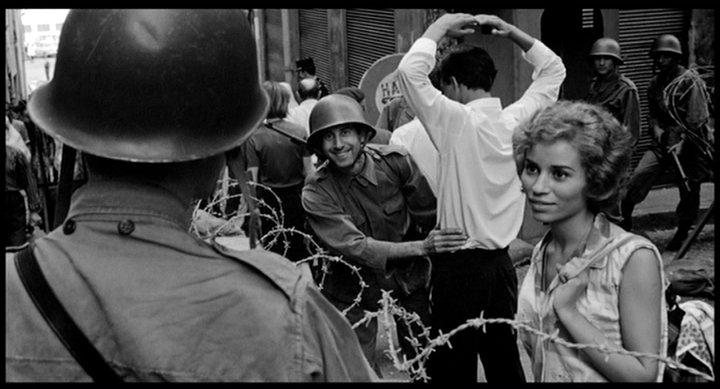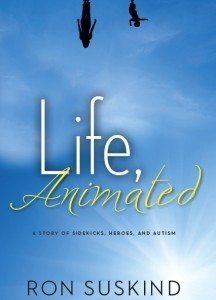I found it very interesting how even though these companies lost tons of money, their CEOs were still walking away with a large salary. I also found it interesting the director decided to make the point how the poor were the ones that were affected more because they lost their houses, jobs, and income. At one part in the film, the director said “the poorest pay the most” which I find to be very accurate. I also found it interesting how the director made the point how Bush made tax cuts for the top 1% but they were not the ones being affect. It seemed that the poor were not helped during this situation and no one really did anything to help them.
Documentaries: Role of an Interviewer
Whether it be in journalism or film, when it comes to interviews there is no one more powerful than the interviewer. Many people assume that the subjects, or interviewees, are the key to an effective interview, and while in some cases this may be true, oftentimes a strong interviewer is required to manipulate a session in just the right ways, not only to get the best responses from interviewees, but to gain the most insight into the subject at hand.
That being said, this raises an interesting question: how active should an interviewer be during not only the interview process, but in the final cut of the interviews/film? Is it better for the interviewer to remain an invisible presence in the film, like in Miss Representation, where the audience only hears the interviewee’s edited responses, rather than hearing the questions being asked? Or is it better for the interviewer to be an active character in the film, like in Inside Job, where they interrupt and directly interact with the interviewees, inserting their opinions into the film? Which feels more realistic, or relatable? Or does it depend on the medium or the topic/message that the film is trying to convey? I am sure that there is no concrete answer to these, but they’re pretty interesting to think about.
Life, Animated: Adaptation or Continuation?
I thought that the coolest part of Roger William’s talk last week was when he was discussing his latest project Life, Animated, about the story of Owen Suskind, the young man with autism who found comfort and expression in Disney films. I could probably go on about how awesome his story is, and how cool the amount of access that Roger and Owen got into the Disney Animation archives is, but what I thought was really interesting was that, towards the end of this discussion, Roger mentioned how the film was actually based on a book written by Owen’s father, Ron Suskind.
I started researching the book after the discussion (I’m considering buying it actually, because the reviews are pretty positive and the story that Roger told us seemed awesome), and found that a whole website was created around it, and that many of the posts tell not only Owen’s story, but the stories of numerous other children with autism who found comfort in Disney. It made me realize how Owen’s story is a continually growing process, and how it has continued past the events of Suskind’s book, and will continue past the events filmed by Roger Williams. When I found that the documentary was using the same title as the book, I was afraid that Roger was going for an adaptation of sorts (which raises the question of whether or not documentaries can be adapted from source materials faithfully, the way that some films can be adapted from fiction novels), but I realized that instead of being an adaptation, it is more like a continuation of the book. It deals with the same character, and similar themes, but it shows a new side to Owen, an older side, and serves as an update and hopefully an expansion of what the book provides. It’s not a sequel, but rather a Part II to a story that I think is far from over.
The link to the website is posted below and I definitely think that it is worth checking out.
Star Wars’ Legacy
Since the new trailer for the upcoming Star Wars film was released today, I thought I would bring up Star Wars and it’s influence on film and pop culture in general. Star Wars is one of the few franchises that has almost universal appeal – pretty much everyone has at least seen a Star Wars movie and if you haven’t, you’re met with what could only be described as incredulity. Everyone knows what Star Wars is and this most recent trailer hinges on that fact – literally every line/frame in this trailer is a call back to the original trilogy of movies. From Darth Vader’s destroyed helmet to Harrison Ford proudly proclaiming that he’s “home,” this new Star Wars seems to be incredibly aware of it’s place in our culture. Time will tell if it lives up to everything that has come before.
Group 1’s Use of a Go Pro
As I said in class, I really like the idea of the first group using a Go Pro. These cameras are small, and are valuable because they are specifically designed for sports and extreme activities, where every single second of recording can be valuable. Unlike any normal camera, the Go Pro allows you to capture the entirety of the activity and not just the selected or few “posed moments”. I’m excited to see what the first group is going to come up with, whether or not their film turns out they way they expected.
Panopticon vs. Miss Representation
After watching both documentaries, I believe the two documentaries had very different style. I believe Miss Representation wanted to try and change women’s portrayal in the media, while Panopticon was to make people aware of the lack of privacy we have due to surveillance cameras, the Internet, and more. Additionally, I believe that Miss Representation interviewed not only more people to try and demonstrate Newsom’s point, but also interviewed more experts, people in powerful positions, and first-hand experiencers of the problem Newsom was addressing. In Panopticon, Vlemmix interviewed several experts, as well as everyday people. While both documentaries were effective and made the point they wanted to, I thought Miss Representation was more of an effective documentary. For me, this was due to the fact that Newsom gathered more opinions and perspectives about women’s portrayal in the media, which made it more relatable to me and kept the documentary more interesting. In addition, I believe Newsom’s documentary showed more passion and wanted to spark change, whereas Vlemmix’s documentary tried to make us more aware and sort of scare us instead of spark change.
Panopticon
After watching Panopticon, the facts presented in the film kind of shocked me. While I knew Facebook, Google, and many other search engines or forms of social media can gather tons of information on all of their users, it was surprising to actually hear what kind of information the Internet can gather from individuals. Additionally, even though a majority of the information and data received through the Internet is looked at, it is still kind of scary to know they have access to a lot of our information.
Furthermore another thing I found interesting about the film was the privacy those in the Netherlands had as compared to other countries. In the Netherlands they practically have cameras everywhere and as shown in the beginning of the film when Vlemmix goes into the liquor store and they have a person through a computer verify his identification, showing they have minimal privacy. However, while the Netherlands is very active on spending money on this technology to prevent crimes, not only have their crime rates gone down, but people in the Netherlands trust their government the most out of any European country, which I find surprising due to the fact that it appeared as if they had little to no privacy. I believe this is due to the fact that the Dutch people have become used to these policies, have trusted their government for awhile, and believe as if they have nothing to hide, which is what many people said in individual interviews. Finally, another thing I found interesting was when these cameras, trackers, etc. were placed in Germany, the people strongly resented the new technology, while the people in the Netherlands just accept it now.
Accountability
After viewing Inside Job we had a nice discussion about accountability. I really enjoyed how Ferguson showed that no one took responsibility but instead played it off as if they had no idea what had happened. It is really interesting because the “Securitization Food Chain” as the movie labeled had many people from all different sectors involved. It was almost as if everyone from Investment banks, to mortgagers, to lenders, to insurance agencies all had incentive to continue selling as they were all making money. It was more of a time of extreme greed. Because of all the moving parts, it is hard to place accountability on just a few people but it is also clear that the people interviewed had a much bigger role and knowledge as to the corruption they were involved in. It is a shame they acted so innocent. After thinking about it though, put yourself in their shoes. Obviously what they did was wrong, but I cannot imagine it being easy to take responsibility for causing a global recession that resulted in millions of lost jobs while you sat back and earned millions and millions of dollars. Obviously, taking accountability for your actions is something you learn growing up to be a gentleman or a lady. The corruption of these men was not very gentleman-like at all and therefore I believe them stepping up and taking responsibility and accountability for their actions is much easier said than done.
“Hipster Racism”
http://nerdist.com/stereotypes-and-comedy-finding-where-the-line-is/
It’s all about intent right? I didn’t mean to be racist when introducing my black friend as “my black friend” and because I’m not wanting to be racist its ok to TOTALLY BE RACIST. I think the problem with vines that deal with seterotypes is that today racism is much more insidious, it lives in irony, microaggresions, and the way we use language. Now that we can’t actually say racist things, they’re coming out in irony by pretending to say racist things, which perpetuates those stereotypes and essentially makes no progress in moving towards a place where we don’t have those subconscious biases. To quote Lindy West: “People in positions of power simply cannot make jokes at the expense of the powerless.” I attached some easy read articles with videos that I think are really on point. http://jezebel.com/5905291/a-complete-guide-to-hipster-racism
Incriminating Evidence
I thought that it was really interesting how when we watched “The House I Live In” we discussed how the information presented in the documentary could be used as incriminating evidence and the subjects in the documentary are in danger of being prosecuted. However, when we viewed “Inside Job” that wasn’t mentioned at all even when the crimes of manipulating the economy (I believe) are significantly more severe than drug use. I feel like we have a certain bias towards educated vs. non-educated people manipulating the system. All the people in Wall Street are educated and manipulate the system in their favor while putting millions of people at a disadvantage and no one is quick to anger with them and call for justice. However, it’s so easy for people to demonize crimes committed by less educated people and be enraged that they dare test the system. I think there are many factors leading into this phenomenon, (race, class, education level) but it makes it no less disturbing.

